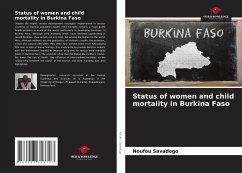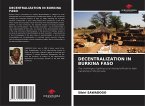Despite the health service development strategies implemented in various countries to improve population health, child mortality remains a major public health problem in much of the world, particularly in developing countries. In Burkina Faso, although child mortality levels have declined significantly in recent decades, they remain not only high, but among the highest in the world. Also, although mothers are the guarantors of children's health, the economic, social and cultural difficulties they often face prevent them from fully playing this role. In light of these findings, this study aims to provide decision makers with the information needed to improve programs to reduce child mortality levels in Burkina Faso. The analyses show that the higher the mother's status, the lower the risk of death. The influence of intermediate variables on the relationship between the status of the woman and child mortality was also highlighted.
Bitte wählen Sie Ihr Anliegen aus.
Rechnungen
Retourenschein anfordern
Bestellstatus
Storno








